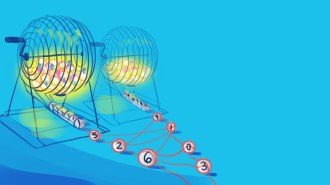You probably know the drill. You have 75 minutes to answer 60 math questions. The first set of 25 multiple-choice questions must be completed in 30 minutes.
There are 20 packages of bagels on a shelf in a store
and each package contains the same number of bagels.
If 3 of these packages contain a total of 18 bagels, how
many bagels are there in 7 of these packages?
(A) 21 (B) 36 (C) 40 (D) 42 (E) 49
That’s what a college-bound student faces in taking the ubiquitous SAT I: Reasoning Test.
The official SAT handbook notes that the speed with which students answer the questions should play, at most, a minor role in deciding the scores. Many students, however, believe that, if they had extra time, they would do significantly better. And some students do apply for an extension, generally citing learning or physical disabilities.
Now, a team of statisticians has tackled the question of which students appear to benefit most from additional time on the SAT. Reporting in the current issue of Chance, the researchers conclude that the students who benefit most on the math half of the SAT are those who are most able.
“When able examinees are given extra time in mathematics, they can improve their scores: the more able, the greater the improvement,” Howard Wainer of the National Board of Medical Examiners and his colleagues wrote.
Wainer collaborated with Brent Bridgeman, Michelle Najarian and Catherine Trapani of Educational Testing Services in Princeton, N.J., to conduct the study to examine the extent to which extra time affects SAT scores.
Data for the study came from the SAT administered in October 2000. Each form of the SAT has three math sections, three verbal sections, and one special section that is used for various other purposes and is not scored as part of the test. For the study, a random sample of about 100,000 test-takers were divided into 10 groups, with each group getting a different, specially constructed set of questions in the experimental section.
In effect, the researchers could compare performance on standard-length test sections with performance on test sections that were 14 percent, 25 percent, and 47 percent shorter.
Interestingly, analyses of the results showed that extra time had a statistically significant impact on math scores, but there were no significant trends revealed in the verbal portion.
Moreover, “more time yields higher scores and the greatest benefits accrue to the highest performing examinees,” Wainer and his colleagues noted. “Gains of almost 35 points are expected for high-scoring examinees if they are given 50 percent more time.”
Not surprisingly, the researchers found that “items toward the end of the test are more likely to be answered correctly than they are when time is in shorter supply.”
On the verbal portion of the test, time did not appear to play any role in which questions were answered correctly.
In general, “sometimes higher ability examinees do better with extra time, but sometimes they do worse,” the researchers said. Overall, more time doesn’t help.
On the other hand, math scores are clearly affected by the time available. “When such tests are administered with extra time, the scores obtained cannot be interpreted in the same way as tests administered with the standard time allocation,” Wainer and his colleagues concluded.






